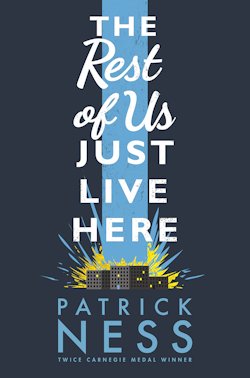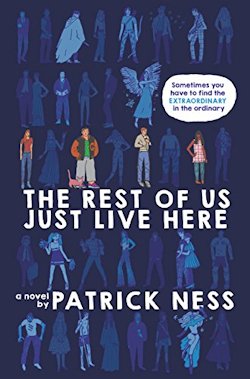In the suggestive sentence attached to the first chapter of The Rest of Us Just Live Here, “the Messenger of the Immortals arrives in a surprising shape, looking for a permanent Vessel; and after being chased by her through the woods, indie kid Finn meets his final fate.”
The world is ending again, evidently. But never mind the Messenger—the impending apocalypse its presence heralds is not the point of Patrick Ness’ latest revelation. There are indeed dark times ahead for the friends of indie kid Finn—this Immortals nonsense will lead to any number of melodramatic deaths—but the household heroes of The Rest of Us Just Live Here are safely outside of said circle.
That’s not to say their days lack drama, or tragedy, but like you and me, reader, rather than the saviours at the centre of so many Chosen One stories, just living keeps them plenty busy.
We yearn the same, wish the same. We’re just as screwed-up and brave and false and loyal and wrong and right as anyone else. And even if there’s no one in my family or my circle of friends who’s going to be the Chosen One or the Beacon of Peace or whatever the hell it’s going to be next time around, I reckon there are a lot more people like me than there are indie kids with unusual names and capital-D Destinies.
“Your humble narrator” Mikey Mitchell has hit the nail on the head, here, and the notion that normal is not the same as insignificant informs every last aspect of the new novel from the mind behind A Monster Calls.
In Mikey’s lifetime alone, his peers have had to go head to head with the undead, exorcise a horde of soul-eating ghosts, fend off an influx of very attractive vampires, and for a while there, the indie kids in this suburb of a suburb of a city “were all dying beautifully of cancer.” Must have been some fault in the stars.
Their lot in life, then, might be seen by some as unlucky, but the thing is, they’ve solved their so-called problems—whether by beating them up a bunch or sacrificing their nearest and dearest, season finale style. It wouldn’t do to diminish their issues, but the nightmares mundies like us have to deal with aren’t so easily addressed.
 The Mitchells make for a fine for instance of this. Mikey’s dad’s a duplicitous drunk; his mom’s a small town politician with big city ambitions and precious little time left to give a shit about her kids; meanwhile Mel—Mikey’s big sister—has body image issues that have already led to her death and subsequent resurrection.
The Mitchells make for a fine for instance of this. Mikey’s dad’s a duplicitous drunk; his mom’s a small town politician with big city ambitions and precious little time left to give a shit about her kids; meanwhile Mel—Mikey’s big sister—has body image issues that have already led to her death and subsequent resurrection.
Though she still has her moments, Mel’s mostly okay these days, and in that, she’s a lot like Mikey, who used to get caught in these obsessive little loops, and still does sometimes. “There’s so much crazy in this world, my counting and hand-washing and door-locking and checking and tapping can seem like raging mental health by comparison,” but that’s no laughing matter either.
Only Meredith, the littlest Mitchell, is free and clear of these crises, and only then if you accept that the deep feelings she has for the members of this one boy band are fine. In just a couple of months, Bolts of Fire are coming to play the area, and more than anything, Merde Breath wants Mikey and Mel to take her. They will do, too, being siblings of the sweetest sort, but they’ve both got plenty else on their plates, not least their graduation, and the beginning of their lives as adults afterwards.
And that’s pretty much the plot—unless you include the infrequent bits about the ongoing conflict between the Immortals and the friends of Finn, which you shouldn’t. The Rest of Us Just Live Here isn’t about them: it’s about the figures you’d find on the fringes of the fiction the indie kids represent. It’s about real people dealing with real problems in something resembling the real world rather than the Buffy the Vampire Slayer revival happening in the background.
To be clear, The Rest of Us Just Live Here isn’t an attack on stories about Chosen Ones in the slightest—if anything, the Carnegie Award-winning author’s assemblage of Twilight and the like is affectionate—but in an era altogether overwhelmed by them, Ness’ novel is a timely reminder that the industry might have lost sight of something special in its clamour to capitalise on the aforementioned formula.
Not everyone has to be the Chosen One. Not everyone has to be the guy who saves the world. Most people just have to live their lives the best they can, doing the things that are great for them, having great friends, trying to make their lives better, loving people properly. All the while knowing that the world makes no sense but trying to find a way to be happy anyway.
Let me count the ways in which this oh-so-satisfying standalone made me happy: in its credible, kind-hearted characters; in its strangely relatable reality; in its unpretentious presentation of difference; in its remarkably restrained pace; in its generous prose. I could go on, but better, I expect, to leave you something to discover—something ordinary, yet extraordinary.
The Rest of Us Just Live Here is a truly beautiful book that, on the back of More Than This and the Chaos Walking novels, cements Patrick Ness’ reputation as the most consistently brilliant writer of YA today. Read it, readers.
The Rest of Us Just Live Here is available from HarperCollins in the US and Walker Books in the UK.
Niall Alexander is an extra-curricular English teacher who reads and writes about all things weird and wonderful for The Speculative Scotsman, Strange Horizons, and Tor.com. He lives with about a bazillion books, his better half and a certain sleekit wee beastie in the central belt of bonnie Scotland.










